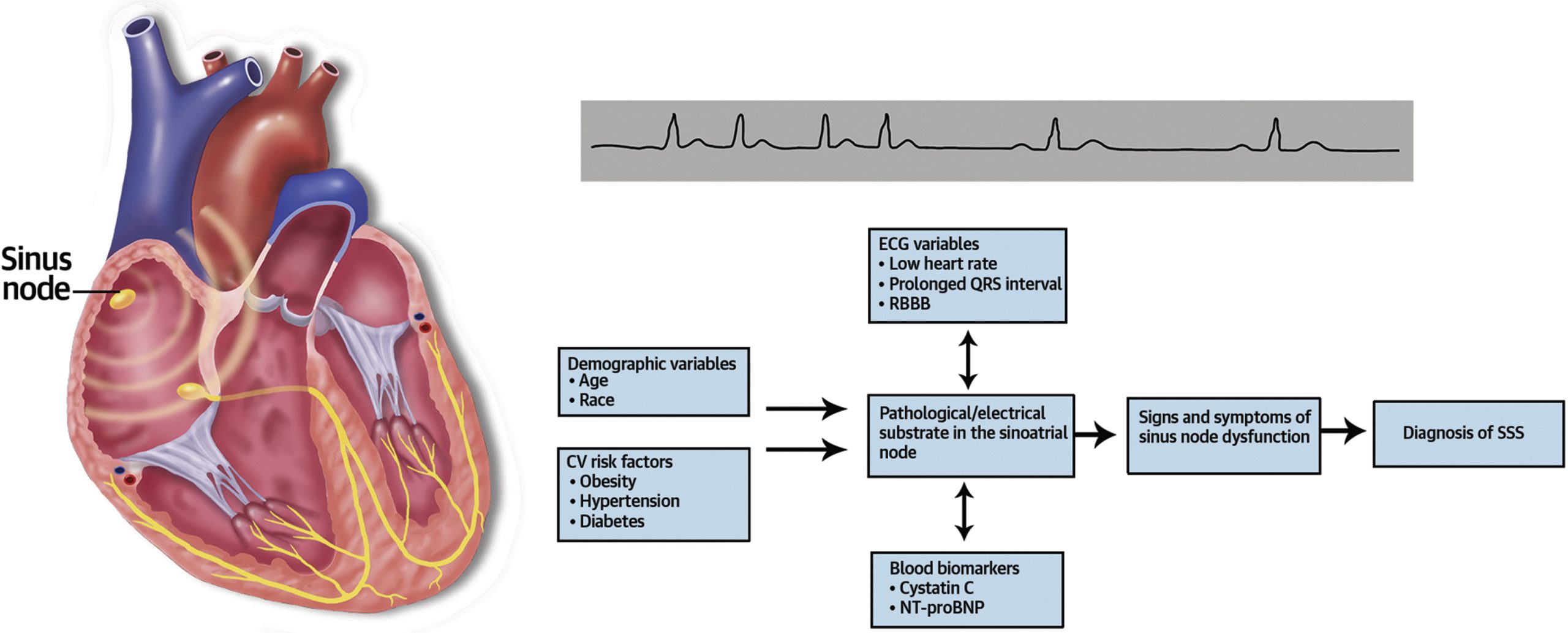Demystifying Sick Sinus Syndrome: Causes, Symptoms, and Treatment
Welcome to our comprehensive guide on Sick Sinus Syndrome (SSS), a cardiac disorder that affects the heart’s electrical system. In this article, we’ll delve into the intricacies of SSS, from its causes and symptoms to the various treatment options available. By the end, you’ll have a clear understanding of this condition and the steps you can take if you suspect you have SSS.

Understanding Sick Sinus Syndrome:
Sick Sinus Syndrome, often referred to as SSS, is a complex cardiac condition that primarily affects the sinus node, a small cluster of cells in the heart responsible for initiating electrical impulses. These impulses regulate the heartbeat, ensuring it stays within a normal rhythm. However, in individuals with SSS, this system malfunctions, resulting in an irregular heartbeat.
Symptoms of SSS:
Bradycardia: SSS often leads to bradycardia, where the heart beats unusually slowly.
Tachycardia: Paradoxically, it can also cause tachycardia, where the heart beats too fast.
Dizziness and Fainting: Due to irregular heart rhythms, individuals with SSS may experience dizziness or even fainting spells.
Fatigue: Persistent fatigue is a common symptom, as the heart struggles to maintain a steady pace.
Causes and Risk Factors:
Understanding the underlying causes and risk factors associated with Sick Sinus Syndrome is crucial for early detection and management.
Common Causes:
Age: SSS is often seen in older adults, as the sinus node can deteriorate with age.
Heart Diseases: Underlying heart conditions such as coronary artery disease or heart attacks can damage the sinus node.
Medications: Certain medications, like beta-blockers or calcium channel blockers, may contribute to SSS development.
Recognizing Risk Factors:
Medical History: If you have a history of heart disease or heart-related procedures, you may be at higher risk.
Medication Usage: Inform your healthcare provider about any medications you’re taking, as some can trigger or exacerbate SSS.
Family History: A family history of heart conditions can increase your susceptibility.
Early recognition of these causes and risk factors can lead to timely intervention, potentially preventing the progression of SSS.
Signs and Symptoms:
Identifying the signs and symptoms of Sick Sinus Syndrome is essential, as they can vary in intensity and impact daily life.
Common Symptoms Include:
Bradycardia: SSS often causes episodes of an abnormally slow heart rate, leading to fatigue and dizziness.
Tachycardia: Paradoxically, individuals with SSS may experience periods of rapid heartbeats, causing palpitations.
Dizziness and Fainting: The irregular heart rhythms can result in dizziness, lightheadedness, or fainting, known as syncope.
Fatigue: Ongoing fatigue is a prevalent symptom, making it difficult to engage in regular activities.
Recognizing these symptoms is vital. If you or a loved one experiences them, seek medical evaluation promptly. Early diagnosis can lead to effective treatment and improved quality of life.
Diagnosis and Medical Evaluation:
Diagnosing Sick Sinus Syndrome requires a comprehensive medical evaluation, often involving several diagnostic tests and procedures:
Key Diagnostic Methods:
Electrocardiogram (ECG): This test records the heart’s electrical activity and can reveal irregular rhythms associated with SSS.
Holter Monitoring: A portable ECG device is worn for 24-48 hours to capture any irregularities that may not appear during a standard ECG.
Long-Term Outlook and Success Stories:
Understanding the long-term outlook for individuals living with Sick Sinus Syndrome (SSS) is essential for both patients and their families. While SSS presents challenges, many individuals successfully manage their condition and lead fulfilling lives.
Positive Prognosis:
With proper medical care and lifestyle adjustments, many people with SSS experience improved quality of life.
Regular check-ups and adherence to prescribed treatments are crucial for long-term success.
FAQs About Sick Sinus Syndrome
Q: What is Sick Sinus Syndrome (SSS), and what causes it?
A: SSS is a heart rhythm disorder characterized by abnormal sinus node function. Causes include age-related degeneration and heart diseases.
Q: What are the common symptoms of SSS?
A: Typical symptoms include bradycardia (slow heartbeat), tachycardia (rapid heartbeat), dizziness, fainting, and persistent fatigue.
Q: How is SSS diagnosed by healthcare providers?
A: Diagnosis involves tests like Electrocardiograms (ECG), Holter monitoring, and Electrophysiological Studies (EPS) to assess the heart’s electrical activity.
Q: Who is at risk for developing SSS?
A: Older adults, individuals with heart diseases, and those on specific medications have a higher risk of developing SSS.
Q: Can SSS be treated with medications alone?
A: Medications may help manage symptoms but are often combined with pacemaker implantation for effective treatment.
Q: What is the role of a pacemaker in SSS treatment?
A: A pacemaker helps regulate the heart’s rhythm, especially in cases of bradycardia, ensuring it beats at a healthy pace.
Q: Is it possible to live a normal life with SSS?
A: Yes, with proper treatment, lifestyle adjustments, and regular follow-up, individuals with SSS can lead fulfilling lives.
Q: Can SSS lead to more serious heart conditions?
A: SSS can contribute to conditions like atrial fibrillation (Afib), which may require additional monitoring and treatment.
Q: Are there lifestyle changes that can help manage SSS?
A: Adopting a heart-healthy lifestyle with regular exercise, a balanced diet, and stress management can complement medical treatment.
Q: Where can individuals with SSS find support and resources?
A: Support groups, online communities, and healthcare providers are valuable sources of support and information for those living with SSS.
Conclusion:
In conclusion, Sick Sinus Syndrome is a cardiac disorder that requires careful management and ongoing medical supervision. With the right treatment plan, lifestyle adjustments, and support, many individuals with SSS can lead fulfilling lives and enjoy an improved quality of life.
Remember that each person’s experience with SSS is unique, and it’s crucial to work closely with your healthcare provider to tailor a treatment plan that suits your individual needs. Whether you are a patient, caregiver, or simply seeking information, understanding SSS is a significant step toward improved heart health and well-being.




